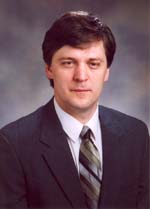ECE Research Seminar (Virtual Event*) April 29, Friday, 12:30 – 1:30 pm
April 18, 2022
Please join us for the final ECE Research Seminar of the semester.
Friday, April 29 12:30-1:30 pm CT on Webex
Quantum Computing for Machine Learning: Introduction to
Quantum Annealing and Gated Quantum Computing
Yaroslav Koshka | ykoshka@ece.msstate.edu
Abstract: Quantum Computers (QCs) are machines based on quantum bits (qubits) that take full advantage of the laws of quantum mechanics (QM). They hold the promise to outperform current classical computing capabilities. There is an expectation that machine learning (ML) will be among the most influential killer apps for the first generation of commercially-available QCs, and specifically for the hardware that will dominate the QC landscape during the so-called Noisy Intermediate-Scale Quantum (NISQ) era. It is predicted that ML will be impacted in the near-term by both Adiabatic Quantum Annealers (AQAs) and gated QCs. Commercial AQAs with more than 100 qubits have been available for more than a decade while no gated QC with more than 100 qubits is currently commercially available. As a result, there is already a rich history of applying AQAs to ML problems. On the other hand, gated QC hardware is attracting great interest today since it is the foundation upon
which a future general-purpose (rather than an application-specific) QC will be based. The recent progress in gated QC hardware, algorithms, and early proof-of-concept applications point to these devices also making substantial inroads into ML, and they currently enjoy the lion’s share of the scientific publications related to quantum ML (QML).
In this talk, we will review the most basic QM concepts behind qubits and the use of the so-called bra-ket notation to describe the state vector of a system of qubits. We will try to build some intuition about the elusive concept of quantum interference, its connection to quantum probability amplitudes, and how interference (usually in a hidden way) may influence probabilistic outcomes compared to those in classical probabilistic models. Finally, we will try to address typical misunderstandings about quantum parallelism. We will proceed by introducing AQAs and their connection with undirected probabilistic graphical models (Markov Random Fields), which are an important part of the modern ML toolkit. Two main tasks – combinatorial optimization and sampling from complex probability distributions – will be discussed. The presenter’s own work with generative models based on Restricted Boltzmann Machine (RBMs) will be introduced next, along with the
reasons for why the availability of the AQA hardware reignited interest in those models.

Dr. Yaroslav Koshka
Dr. Yaroslav Koshka is a Professor in Electrical & Computer Engineering at the Mississippi State University (MSU), the director of the Emerging Materials Research Laboratory and the chair of the Quantum Information Science and Quantum Computing (QIS & QC) Working Group. His current main research area is quantum computations and their application to machine learning. Other research interests include computer-aided design of micro- and nano-electronic materials and devices, their characterization, defect engineering, synthesis of wide-bandgap semiconductor materials and nanostructures, physics of semiconductor devices, and nanoelectronics. He received a Ph.D. in Electrical
Engineering from the University of South Florida in 1998.
* For further information contact: Dr. Jenny Du | du@ece.msstate.edu | 5-2035
For WebEx Information, scan the QR Code or use this link.
The Department of Electrical and Computer Engineering at Mississippi State University consists of 27 faculty members (including 6 endowed professors), 7 professional staff, and over 700 undergraduate and graduate students with approximately 100 being at the Ph.D. level. With research expenditure of the department in excess of $11.94 million, the department houses the largest High Voltage Laboratory among North American universities. For more detailed information on the department, please visit our website www.ece.msstate.edu.
